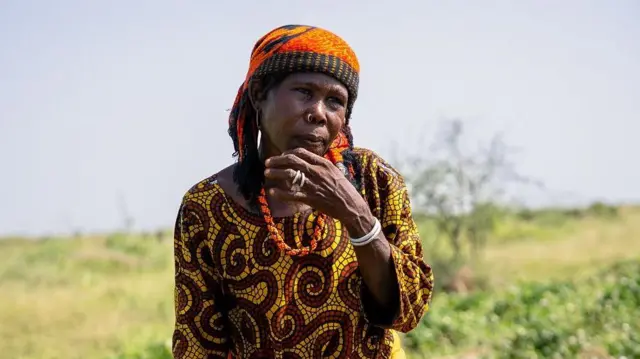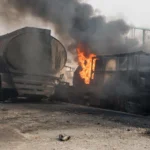In the far corners of north-eastern Nigeria, survival has become an act of courage. Women bent over fields of beans and maize under the hot Borno sun are watched over by men in uniform, armed with heavy rifles. These are the Agro Rangers a special security force created to protect farmers from the constant threat of attacks by Boko Haram and Islamic State West Africa Province (ISWAP).
For farmers like 50-year-old Aisha Isa, tending her crops is both a livelihood and a gamble with death. She and dozens of others are transported daily from Maiduguri to Dalwa village, a journey of less than an hour, to cultivate the land within military trenches carved out for their safety. “There is fear we fear for our souls,” she says, her voice filled with anxiety as she weeds her small plot. “We will take the risk and come even if the rangers are not coming.”
For more than 15 years, Borno has been at the heart of Nigeria’s deadly insurgency. Thousands have been killed, millions displaced, and once-fertile farmlands have turned into battle zones. The Armed Conflict Location and Event Data (ACLED) group reports that targeted attacks on farmers have more than doubled in 2025 compared to the previous year.
The government’s response has been twofold — a push for resettlement and the creation of the Agro Rangers under the Nigeria Security and Civil Defence Corps (NSCDC). Governor Babagana Zulum has accelerated the reintegration of displaced people to restore food production and revive rural life. But aid agencies warn the plan is dangerously premature. The International Crisis Group says returning people to unsafe farmlands exposes them to abduction, extortion, and death.
One survivor, Abba Mustapha Muhammed, still lives in terror after being kidnapped by militants along with nine others. “There was one man they killed because he couldn’t pay the ransom,” he recalls. “They threw his body away. His family was told to come and take it.” Muhammed spent three days in captivity, surviving on scraps of food and dirty water. “The hunger and sickness were unbearable,” he says, trembling. “The insurgents are still out there. Just yesterday, they abducted more than ten people.”
Despite these dangers, officials defend the Agro Rangers initiative. Commander Mohammed Hassan Agalama, who leads the unit in Borno, insists their presence has reduced attacks. “We have not seen more terrorists coming to attack the farmers because they know we are on ground,” he says. Yet, the challenge remains massive. “We cannot be everywhere. We are not spirits. Can 600 Agro Rangers cover all the farms in Maiduguri? No.”
Across the state, fear grips entire communities. In Maiduguri’s city centre, sorghum farmer Adam Goni meets with fellow farmers under a tree’s shade. Goats wander nearby as the men and women share stories of loss. One of them, 62-year-old Baba Modu, speaks through tears about his nephew, shot dead by Boko Haram. “They kill people like ants,” he says. “When I go to farm, there’s always fear. I don’t have peace of mind even at home. I sleep with my eyes open.”
The insecurity has crippled agriculture and deepened hunger. The United Nations warns that nearly four million people in Nigeria’s northeast face severe food insecurity this year. For families who rely on farming, every trip to the field is a fight for survival. “Even if you are starving and food is scarce, you can’t go to the farm,” says Modu. “When you try, they chase you away or kill you.”
The Nigerian government has vowed to expand the Agro Rangers project, calling it a cornerstone of its strategy to protect farmers and rebuild food systems. But on the ground, many believe the military could do much more. “If the government is serious, within a month Boko Haram will end in Nigeria,” says Goni. “We are angry. We are tired of living like this.”
Officials like NSCDC spokesperson James Bulus urge patience, arguing that peace takes time. “You cannot do it in one day,” he says. “It has to undergo many processes.” Yet for the people of Borno, those processes have taken far too long.
Each morning, the farmers of Maiduguri still board buses headed for fields surrounded by trenches and soldiers. They work with fear in their hearts, aware that the land that sustains them could also claim their lives. Their courage stands as a testament to human resilience in the face of terror a reminder that even in war-torn soil, seeds of hope continue to grow.














Leave a comment